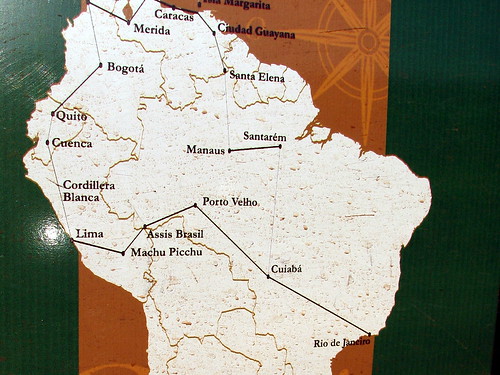BRAZIL AND PERU PURSUE TRANS-CONTINENTAL DEVELOPMENT

Peru's President-elect Ollanta Humala and Brazil's ex-President Luiz Inacio Lula da Silva
As trans-continental development fever spreads back and forth from Atlantic to Pacific and beyond supported by new infrastructures of roads, bridges, ports, dams and transmission lines, there is also a trans-national politics emerging.

Trans-continental highway linking Rio de Janeiro, Brazil and Lima, Peru
Peru's economy has grown between 6 and 7 per cent annually for the past several years, mostly as a result of its booming mining industry, "but the time has come to move to the social-inclusion stage that allows everyone, and not just the elite, to enjoy the benefits of this growth," President-elect Ollanta Humala recently told a told a news conference in Brasilia.
For this, he may follow the pattern set by Brazil's super-star Lula. Indeed, the US-based Brookings Institution reports that Brazil's Labor Party (PT), in an uncharacteristic form of cross-boundary political influence, sent advisers to help Humala remake his electoral image from a Chavez-like radical to a Lula-like Left-Centrist.
Humala, in finding his own best way, may draw additional inclusion lessons from Brazil's extremely controversial (and Lula-backed) Belo Monte Dam that has demonstrated the difficult politics and devastating consequences of mega-dams that run roughshod over local people and nature. For example, deforestation in May, which is on the rise again in Brazil, was highest in the municipality of Altamira, Para, where the controversial Belo Monte dam is to be constructed. Perhaps, future Peruvian planners will learn as well that both local people and local land-use change will have to be included in planning for national development.
Regarding Brazil's determined effort to ignore local concerns at Belo Monte, Amazon Watch reports:
Brasilia, Brazil – 16 June 2011 - Local communities and NGOs delivered a petition to the Organization of American States’ (OAS) human rights body today claiming that Brazil has steamrolled human rights in its rush to fast-track construction of the controversial Belo Monte Dam, slated for construction on the Xingu River in the Amazon interior. The petition, signed by representatives of indigenous communities and other populations threatened by the dam, denounced the Brazilian government and called on the Inter-American Commission on Human Rights (IACHR) to declare human rights violations and order the Brazilian government to cancel the project and pay damages.
Two weeks ago the Brazilian government defied IACHR’s demand that Brazil halt the dam’s licensing process. Brazil instead granted Belo Monte’s installation license, clearing the way to commence construction despite blatant non-compliance with social and environmental protections.
NGO and legal groups expect the Commission to determine that the Brazilian government has violated the rights of local peoples, and will recommend compensation. If the government continues to ignore the IACHR, the case could go to the Inter-American Court on Human Rights, which could formally condemn the Brazilian government for violations of its international obligations.
In a more hopeful sign from Peru, Mongabay reports:
16 June 2011 - Three years of sustained community opposition have brought down plans for a massive dam on the Madre de Dios River in Peru. Yesterday the Peruvian government announced it was terminating the contract with Empresa de Generación Eléctrica Amazonas Sur (Egasur) to build a 1.5 gigawatt dam, known as the Inambari Dam. The dam was one of six that were agreed upon between Peru and Brazil to supply the latter with energy.
"Although this resolution does not prevent the construction of all dams in the Inambari Basin, it is very important .... The resolution states that all future proposed projects must be subjected to prior consultation with local communities," said Aldo Santos, from local NGO SER (Rural Educational Services), in a press release. The cancellation follows a month long strike by 2,000 people against the dam as well as mining and oil projects in the region.






No comments:
Post a Comment